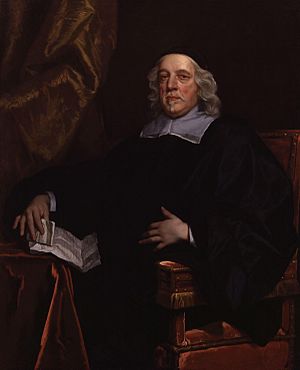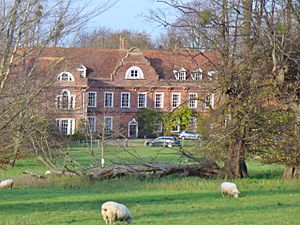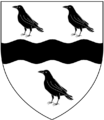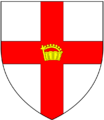Edward Nicholas facts for kids
Quick facts for kids
Sir Edward Nicholas
|
|
|---|---|

Portrait by Peter Lely
|
|
| Born | 4 April 1593 Wiltshire, England
|
| Died | 1669 West Horsley, England
|
| Spouse(s) | Jane Jay |
Sir Edward Nicholas (born April 4, 1593 – died 1669) was an important English government official and politician. He served as a Secretary of State for two kings, King Charles I and King Charles II. He was also a member of the House of Commons, which is like a part of today's Parliament.
Contents
A Life in Public Service
Edward Nicholas was born in Wiltshire, England. He was the oldest son in his family. He went to school at Salisbury grammar school and Winchester College. Later, he studied at Queen's College, Oxford university.
Starting His Career
After studying law, Nicholas began working for important people. In 1618, he became the secretary to Edward la Zouche, 11th Baron Zouche. Lord Zouche was in charge of the Cinque Ports, which were important coastal towns.
In 1621, Nicholas was chosen as a Member of Parliament for Winchelsea. He was elected again in 1624. Nicholas kept detailed notes about all the Parliament meetings he attended.
When Lord Zouche left his job, he recommended Nicholas to the Duke of Buckingham. The Duke then hired Nicholas as his secretary in 1624.
Working for the Admiralty
In 1625, Nicholas became the first person to hold the job of Secretary to the Admiralty. This meant he helped manage the Royal Navy. Soon after, he also became a special clerk for the Privy Council. The Privy Council was a group of advisors to the King. His duties focused on navy matters.
In 1628, he was elected as a Member of Parliament for Dover. He served until 1629. At this time, King Charles I decided to rule without Parliament for eleven years. Nicholas wrote a poem about this, which showed his thoughts on the situation.
Advising the King
From 1635 to 1641, Nicholas was a regular clerk for the Privy Council. He handled a lot of business, including collecting a tax called "ship-money." This tax was used to fund the navy.
In 1641, when King Charles I went to Scotland, Nicholas stayed in London. He was responsible for keeping the King updated on what Parliament was doing. When King Charles returned, he made Nicholas a knight. He also appointed him to the Privy Council and made him a Secretary of State. In this role, Nicholas worked closely with the King, even during the English Civil War. He helped with important peace talks, like the Treaty of Uxbridge.
During the Civil War and Exile
Nicholas was a very loyal advisor to King Charles I during the Civil War. He helped arrange the King's surrender to the Scots in 1646. He also handled the surrender of Oxford, which allowed him and his family to leave England.
He went to France and continued to support the royal family. After King Charles I died, Nicholas stayed in Europe. He worked with other royal supporters to help Charles II, who was in exile. Charles II appointed Nicholas as his Secretary of State in 1654, even while they were in exile. Nicholas faced financial hardship during this time.
Supporting Jewish Resettlement
In 1648, Nicholas wrote a pamphlet called An Apology for the Honorable Nation of the Jews. In this writing, he asked for the Jewish people to be allowed to return to England. This was an important step towards religious tolerance in England.
Return to England and Retirement
When King Charles II was restored to the throne in England, Nicholas returned. He became a Secretary of State again. However, he soon retired, even though he didn't want to. King Charles's favorite, Henry Bennet, took his place. Nicholas received some money and was offered a special title, but he felt he was too poor to accept it.
He retired to a country home in Surrey called West Horsley. He bought this home from Carew Raleigh, who was the son of Sir Walter Raleigh. Sir Edward Nicholas lived there until he passed away in 1669.
Family Life
Sir Edward Nicholas married Jane Jay. She was the daughter of Henry Jay, an important London official. They had several sons and daughters.
His oldest son, Sir John Nicholas, also became a Clerk of the Signet and a Clerk of the Privy Council.
His daughter, Susannah, married an Irish statesman named George Lane, 1st Viscount Lanesborough. Like her father, she spent years in exile with Charles II. After the King returned, her family was well rewarded. Susannah died in 1671.
Edward's younger brother, Matthew Nicholas (1594–1661), was also a clergyman. He held important church positions, including Dean of Bristol and Dean of St Paul's.
Writings and Letters
The letters and writings of Sir Edward Nicholas were collected and published in three books in 1920 by the Royal Historical Society. These letters provide a lot of information about his life and the times he lived in.
Images for kids
 | Anna J. Cooper |
 | Mary McLeod Bethune |
 | Lillie Mae Bradford |




